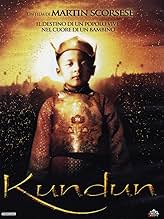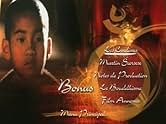From childhood to adulthood, Tibet's fourteenth Dalai Lama deals with Chinese oppression and other problems.From childhood to adulthood, Tibet's fourteenth Dalai Lama deals with Chinese oppression and other problems.From childhood to adulthood, Tibet's fourteenth Dalai Lama deals with Chinese oppression and other problems.
- Nominated for 4 Oscars
- 7 wins & 13 nominations total
Losang Gyatso
- The Messenger
- (as Lobsang Gyatso)
Jigme Tsarong
- Taktra Rimpoche
- (as Tsewang Jigme Tsarong)
Namgay Dorjee
- Kashag
- (as Ngawang Dorjee)
- …
- Director
- Writer
- All cast & crew
- Production, box office & more at IMDbPro
What Scorsese Film Ranks Highest on IMDb?
What Scorsese Film Ranks Highest on IMDb?
Cinema legend Martin Scorsese has directed some of the most acclaimed films of all time. See how IMDb users rank all of his feature films as director.
Storyline
Did you know
- TriviaThe Dalai Lama and his family were portrayed by his real-life relatives, now living in exile. Tenzin Thuthob Tsarong, who played the adult Dalai Lama, is his grand nephew.
- GoofsFor narrative purposes, the timeline is compressed; the Chinese invaded in 1950, the Dalai Lama visited Chairman Mao in Beijing in 1954, and he fled Tibet in 1959.
- Quotes
Indian: Are you the Lord Buddha?
Dalai Lama: I believe I am a reflection, like the moon on water. When you see me, and I try to be a good man, you see yourself.
- Crazy creditsThe Touchstone Pictures logo shown after the end credits is red.
Featured review
I was rendered speechless by KUNDUN when I first saw it, and subsequent viewing have only confirmed my impression that this is one of Scorsese's finest films. Yeah - it's slow and elegant. So what.
I've long held an admittedly superficial interest in Buddhism, and also been a fan of Scorsese, liking most of his films quite a bit, so I went into this with some biases, but with every viewing this seems like a richer film. I also think that Scorsese was in some ways far more at home with this material than he was given credit for being. The cinematography and performances are excellent - the cast of mostly non-actors is surprisingly good, and much of KUNDUN is staggeringly beautiful to watch.
It has also struck me that this film isn't as much of a departure for Scorsese as it first may seem - this film works well as something of a companion to LAST TEMPTATION OF Christ in that both pictures examine great faiths through spiritual figures in a way that personalizes the divine. This simply literalizes undercurrents running through a number of Scorsese's other films, which often turn on themes of loyalty, conviction and ethics (like the self-assurance, against massive obstacles, shown by Alice Hyatt in ALICE DOESN'T LIVE HERE ANYMORE). All evidence a worldview where some form of redemption or transcendance is possible. In their own ways, several memorable Scorsese characters - Sam Rothstein (CASINO), Henry Hill (GOODFELLAS), Rupert Pupkin (KING OF COMEDY), Paul Hackett (AFTER HOURS) and Alice Hyatt attempt this, some in ways that are desperate, comically misguided or just plain wrong, but they're all human, driven by some redemptive impulse nonetheless.
The Catholicism of Scorsese's youth places great value on the importance of ritual, which is also true of Buddhism, which is depicted in a detailed and respectful fashion here, and the rhythm of KUNDUN - where the chronology of events isn't (or at least doesn't seem) forced, but are instead allowed to unfold in a more naturalistic and lifelike fashion also seems to mirror Buddhist ideas admirably.
This is a far more complex film than it first might appear to be - far from being a simple biopic, KUNDUN is much much more. Definitely one of Martin Scorsese's least appreciated films.
I've long held an admittedly superficial interest in Buddhism, and also been a fan of Scorsese, liking most of his films quite a bit, so I went into this with some biases, but with every viewing this seems like a richer film. I also think that Scorsese was in some ways far more at home with this material than he was given credit for being. The cinematography and performances are excellent - the cast of mostly non-actors is surprisingly good, and much of KUNDUN is staggeringly beautiful to watch.
It has also struck me that this film isn't as much of a departure for Scorsese as it first may seem - this film works well as something of a companion to LAST TEMPTATION OF Christ in that both pictures examine great faiths through spiritual figures in a way that personalizes the divine. This simply literalizes undercurrents running through a number of Scorsese's other films, which often turn on themes of loyalty, conviction and ethics (like the self-assurance, against massive obstacles, shown by Alice Hyatt in ALICE DOESN'T LIVE HERE ANYMORE). All evidence a worldview where some form of redemption or transcendance is possible. In their own ways, several memorable Scorsese characters - Sam Rothstein (CASINO), Henry Hill (GOODFELLAS), Rupert Pupkin (KING OF COMEDY), Paul Hackett (AFTER HOURS) and Alice Hyatt attempt this, some in ways that are desperate, comically misguided or just plain wrong, but they're all human, driven by some redemptive impulse nonetheless.
The Catholicism of Scorsese's youth places great value on the importance of ritual, which is also true of Buddhism, which is depicted in a detailed and respectful fashion here, and the rhythm of KUNDUN - where the chronology of events isn't (or at least doesn't seem) forced, but are instead allowed to unfold in a more naturalistic and lifelike fashion also seems to mirror Buddhist ideas admirably.
This is a far more complex film than it first might appear to be - far from being a simple biopic, KUNDUN is much much more. Definitely one of Martin Scorsese's least appreciated films.
- How long is Kundun?Powered by Alexa
Details
Box office
- Budget
- $28,000,000 (estimated)
- Gross US & Canada
- $5,684,789
- Opening weekend US & Canada
- $72,095
- Dec 28, 1997
- Gross worldwide
- $5,684,960
- Runtime2 hours 14 minutes
- Color
- Sound mix
- Aspect ratio
- 2.35 : 1
Contribute to this page
Suggest an edit or add missing content


![Watch Trailer [OV]](https://m.media-amazon.com/images/M/MV5BMDUzYjFiYjAtYTNhNy00NTJmLWIyODAtMDc4NjFkZWMwOTJlXkEyXkFqcGdeQXRyYW5zY29kZS13b3JrZmxvdw@@._V1_QL75_UY281_CR67)























